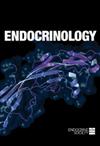β细胞胰岛素抵抗在体外和体内脂肪诱导的β细胞功能障碍中起着因果作用
IF 3.8
3区 医学
Q2 ENDOCRINOLOGY & METABOLISM
引用次数: 0
摘要
摘要 在肝脏、肌肉和脂肪组织等经典胰岛素靶组织中,游离脂肪酸(FFA)水平的长期升高会损害胰岛素信号传导。胰岛素信号分子也存在于β细胞中,在β细胞功能中发挥作用。因此,抑制胰岛素/胰岛素样生长因子 1 途径可能与脂肪诱导的 β 细胞功能障碍有关。为了研究β细胞胰岛素抵抗在脂肪酸诱导的β细胞功能障碍中的作用,我们将双过氧化钒酸盐(BPV)与油酸或橄榄油共同注入大鼠体内48小时。BPV 是一种酪氨酸磷酸酶抑制剂,与大多数胰岛素增敏剂不同,它是一种胰岛素模拟物,不具有任何抗氧化作用,可以防止 β 细胞功能障碍。输注脂肪后,对大鼠进行高血糖钳夹,以评估体内β细胞的功能,或分离胰岛,以评估葡萄糖刺激的胰岛素分泌(GSIS)。我们还用油酸或棕榈酸和 BPV 培养小鼠,以体外评估 GSIS 和 Akt(蛋白激酶 B)磷酸化。接下来,我们给β细胞特异性缺失PTEN(磷酸酶和天丝蛋白同源物;胰岛素信号转导的负调控因子)的小鼠和同窝对照小鼠灌注油酸酯48小时,然后进行高血糖钳夹或体内外GSIS评估。在大鼠实验中,BPV 对脂肪诱导的体内、体外和体外 β 细胞功能损伤均有保护作用。在小鼠体内和体外,β细胞特异性缺失 PTEN 可防止油酸诱导的β细胞功能障碍。这些数据支持这样的假设,即β细胞的胰岛素抵抗在脂肪酸诱导的β细胞功能障碍中起着因果作用。本文章由计算机程序翻译,如有差异,请以英文原文为准。
β-Cell Insulin Resistance Plays a Causal Role in Fat-Induced β-Cell Dysfunction In Vitro and In Vivo
Abstract In the classical insulin target tissues of liver, muscle, and adipose tissue, chronically elevated levels of free fatty acids (FFA) impair insulin signaling. Insulin signaling molecules are also present in β-cells where they play a role in β-cell function. Therefore, inhibition of the insulin/insulin-like growth factor 1 pathway may be involved in fat-induced β-cell dysfunction. To address the role of β-cell insulin resistance in FFA-induced β-cell dysfunction we co-infused bisperoxovanadate (BPV) with oleate or olive oil for 48 hours in rats. BPV, a tyrosine phosphatase inhibitor, acts as an insulin mimetic and is devoid of any antioxidant effect that could prevent β-cell dysfunction, unlike most insulin sensitizers. Following fat infusion, rats either underwent hyperglycemic clamps for assessment of β-cell function in vivo or islets were isolated for ex vivo assessment of glucose-stimulated insulin secretion (GSIS). We also incubated islets with oleate or palmitate and BPV for in vitro assessment of GSIS and Akt (protein kinase B) phosphorylation. Next, mice with β-cell specific deletion of PTEN (phosphatase and tensin homolog; negative regulator of insulin signaling) and littermate controls were infused with oleate for 48 hours, followed by hyperglycemic clamps or ex vivo evaluation of GSIS. In rat experiments, BPV protected against fat-induced impairment of β-cell function in vivo, ex vivo, and in vitro. In mice, β-cell specific deletion of PTEN protected against oleate-induced β-cell dysfunction in vivo and ex vivo. These data support the hypothesis that β-cell insulin resistance plays a causal role in FFA-induced β-cell dysfunction.
求助全文
通过发布文献求助,成功后即可免费获取论文全文。
去求助
来源期刊

Endocrinology
医学-内分泌学与代谢
CiteScore
8.10
自引率
4.20%
发文量
195
审稿时长
2-3 weeks
期刊介绍:
The mission of Endocrinology is to be the authoritative source of emerging hormone science and to disseminate that new knowledge to scientists, clinicians, and the public in a way that will enable "hormone science to health." Endocrinology welcomes the submission of original research investigating endocrine systems and diseases at all levels of biological organization, incorporating molecular mechanistic studies, such as hormone-receptor interactions, in all areas of endocrinology, as well as cross-disciplinary and integrative studies. The editors of Endocrinology encourage the submission of research in emerging areas not traditionally recognized as endocrinology or metabolism in addition to the following traditionally recognized fields: Adrenal; Bone Health and Osteoporosis; Cardiovascular Endocrinology; Diabetes; Endocrine-Disrupting Chemicals; Endocrine Neoplasia and Cancer; Growth; Neuroendocrinology; Nuclear Receptors and Their Ligands; Obesity; Reproductive Endocrinology; Signaling Pathways; and Thyroid.
 求助内容:
求助内容: 应助结果提醒方式:
应助结果提醒方式:


